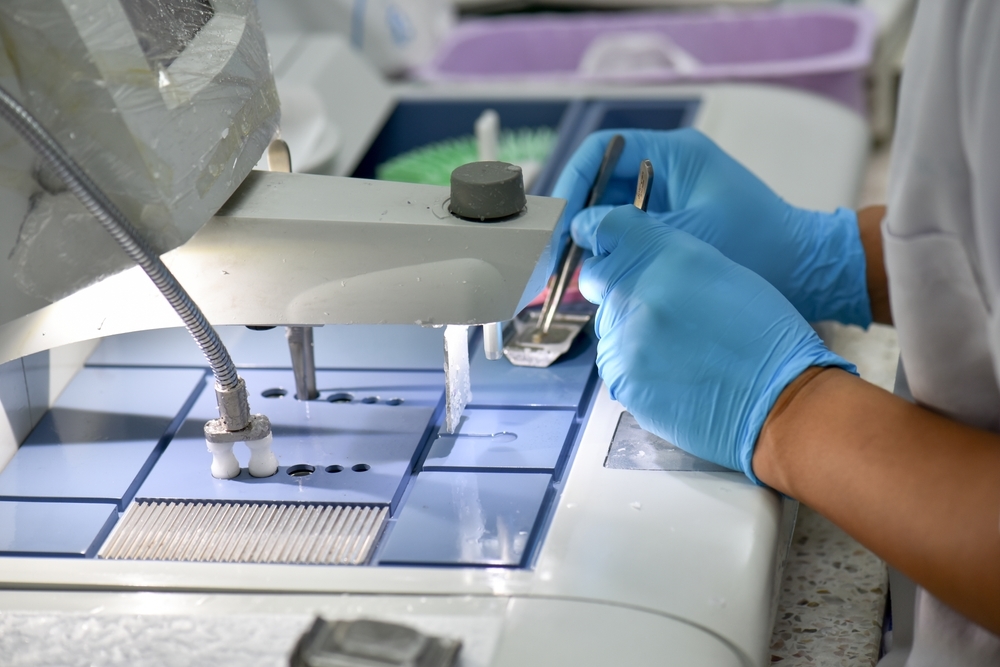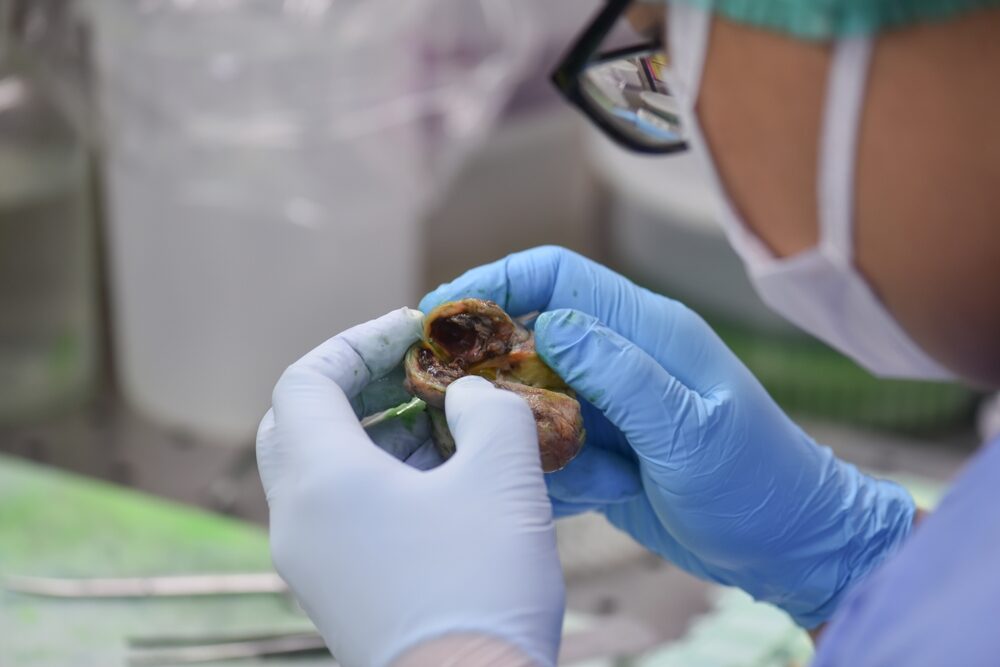
☝️ The most important facts in brief
- A pathologist has a wide range of tasks. These include the examination of samples taken during an operation and clinical autopsies.
- One of the main tasks of a pathologist is to make a diagnosis. These specialists provide important information about a patient's existing illness.
- Pathology is extremely versatile, as it works together with almost all other specialist areas of human medicine.
- To become a pathologist, you must complete a 72-month training programme to become a specialist in pathology after studying medicine.
📖 Table of contents
To a certain extent, pathology is the study of disease at the cellular level, as precise diagnoses are made by analysing tissue, tissue fluid and macroscopic specimens. Pathology is a profession that plays a central role in medicine, as pathologists provide important information on the processes in the body and thus on the best possible treatment.
Are you interested in studying medicine?
We will be happy to advise you free of charge about your options for studying medicine, including advice on studying medicine in another EU country, which is fully recognised in Germany.
What exactly is a pathologist?
A pathologist is a medical specialist who has completed a corresponding specialist training programme after studying medicine. This includes intensive training in the examination of tissue samples, the performance of autopsies and molecular diagnostic procedures.
The term "pathology" was originally coined in ancient Greece and translates as "the study of suffering" or "the study of suffering and endurance". However, the Italian Giovanni Battista Morgagni, who wrote his fundamental work on the subject in the 18th century, and Rudolf Virchow, a German pathologist and researcher from the 19th century, are regarded as the founders of modern pathology.
Even today, pathologists are still the doctors who deal particularly closely with the details of diseases. Unlike in the past, however, they no longer mainly deal with dead people; instead, they mainly examine tissue samples from living people and are often the doctor who ultimately makes the diagnosis.
The various tasks of a pathologist
Most people are familiar with the term "pathologist" and yet many still ask themselves: "What does a pathologist actually do?" We would therefore like to give you an overview of the most important activities.
The work of a pathologist is varied. The majority of pathologists' tasks involve analysing tissue samples and examining body cells under the microscope. Pathology plays an important role in the diagnosis and teaching of diseases. The work carried out there not only ensures precise diagnoses, but also helps to better understand the origin and development of diseases and to develop targeted therapies.
A pathologist also advises doctors from other specialisms and examines tissue samples for them. Pathology is therefore an indispensable field for the other specialist areas, without which, for example, the complete removal of a tumour would not be possible as precisely as it is thanks to modern pathological frozen section examinations.
In the following sections, we will give you an overview of the individual tasks of pathology and show you how versatile this subject is.
Carrying out autopsies
A pathologist's job in hospitals is to carry out post-mortems on deceased patients. The primary aim is to ensure and further improve the high quality of treatment. The findings obtained during the post-mortem examination can be valuable for future patients.
In contrast to the past, as a modern pathologist you have relatively little to do with the deceased. Although it does make up part of your work in this speciality, the majority of the tissue that a pathologist examines comes from living patients.
Histopathological examinations
Pathologists analyse tissue samples under the microscope to identify pathological changes. The diagnoses they make are crucial for the treatment of patients.
In this type of examination, tissue removed during a gastroscopy or other medical procedures, for example, is examined under a microscope. This makes it possible to determine whether it is cancer or another disease, or whether the tissue changes are harmless.
Histopathological examinations also play an important role in the complete removal of a tumour: the pathologist carries out the so-called frozen section examination during the operation. This checks whether the incision site is free of diseased tissue or whether the surgeon needs to cut out more in order to really remove everything that would otherwise form new cancer cells within the body.
Cytological examinations
Cytological examinations are another important task in pathology. As a pathologist, you analyse cells isolated from body fluids or tissue smears to identify pathological changes.
These cytological diagnoses play an important role in detecting diseases such as cancer at the earliest possible stage. This enables doctors to plan the best treatment in a targeted manner. The earlier existing diseases are found during diagnosis, the better the chances of recovery. This is another example of the fact that, as a pathologist, you primarily work for the living and have much less to do with the dead than most people assume about this speciality.
Molecular pathology
In this speciality, pathologists deal with questions relating to DNA, RNA and proteins. The causes of diseases that occur at a genetic level are identified here. This makes it possible to make a particularly precise diagnosis and develop a personalised therapy.
Molecular pathology helps, for example, to identify specific genetic changes in a tumour. These findings are crucial for the development of new therapeutic approaches. For example, so-called monoclonal antibodies are used in cancer therapy to specifically target cells that have certain genetic characteristics.
Research and teaching
Pathology is linked to research like almost no other subject. Diseases can be analysed in detail at a cellular level. With the knowledge you gain as a pathologist, you have the opportunity to significantly improve diagnostics and therapy in the long term.
The training of medical students is another important aspect. In the pathology lectures, future doctors learn a lot about a wide variety of diseases. Regardless of the field in which the students will later work, pathology is always an important part of their knowledge and is therefore taught intensively at the university and examined in the state examination.
Pathologists have relatively regular working hours
Pathologists usually work in laboratories and clinics and help to ensure that even difficult cases can be correctly diagnosed. While it is common for some doctors to work in shifts, as a pathologist you are usually only on duty during the day. This allows for a better work-life balance in the medical profession.

There are also exceptions
As with most things, exceptions prove the rule in pathology. In some cases, a pathologist is also required for emergency treatment in critical conditions. In such situations, it is important that an analysis of the affected tissue is available quickly in order to provide the patient with the best possible care. However, working at unusual times is clearly the exception in pathology.
A pathologist is not a forensic scientist
Many people associate a pathologist with someone who solves criminal cases. Some newspaper articles also contain sentences such as "The murder victim was taken to the pathology department". However, this is incorrect in terms of content.
A specialist in forensic medicine undergoes different training to a pathologist, even though the two specialisations have a lot in common. The work of forensic pathologists is to collect evidence. They clarify unnatural causes of death, but also take and analyse blood samples from drivers who have been driving under the influence of alcohol, for example. In cases of rape or child abuse, the forensic pathologist and not the pathologist is also the right person to contact.
While an autopsy in pathology can only be carried out with the consent of the deceased or their relatives, in forensic medicine it is usually ordered by a court.
Becoming a pathologist - what is required
To be able to analyse tissue and diagnose the right disease as a pathologist, you need a lot of specialist knowledge. The path of a pathologist begins with a medical degree and then continues with further specialist training.
Study of medicine
Studying medicine is the first step that prospective pathologists have to master. It usually takes six years and provides comprehensive knowledge about diseases and their causes. During your studies, you will learn the basics of diagnostics and examination. You will learn a lot about the different tissues of the body and how specimens are prepared. However, the main purpose of studying medicine is to give you a comprehensive overview of all specialisms. During this time, you can ask yourself which area you are particularly interested in and where you would like to work as a doctor later on.
Further training as a specialist in pathology
Further training to become a specialist in pathology takes place while you are working as an assistant doctor in a clinic after completing your medical degree. It usually lasts 72 months. During this time, you will learn, among other things:
- Production and handling of paraffin preparations
- Recognising changes in the tissue
- Development of diseases at the cellular level
- Molecular diagnostics
- Legal principles that pathologists must take into account in their work
Once you have successfully completed your specialist training, you can work in a clinic or set up your own business.
Free information material
Studying medicine abroad 🎉
Order your info pack now, find out more about the Studying medicine abroad and get started as a medical student!





